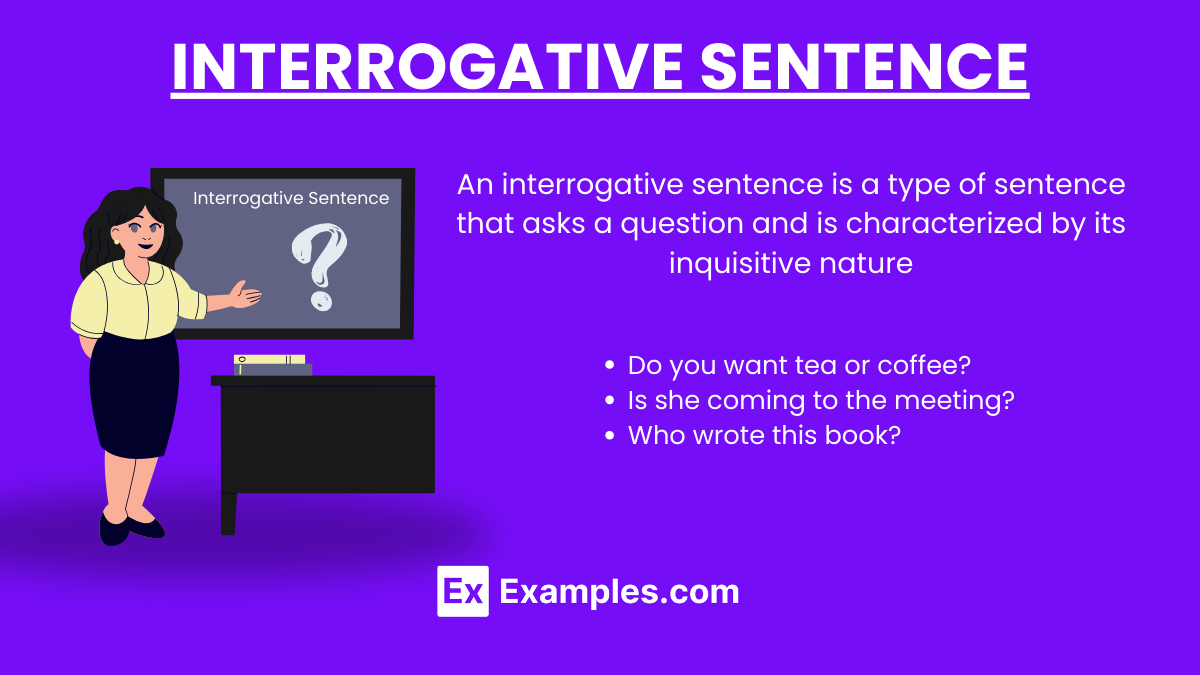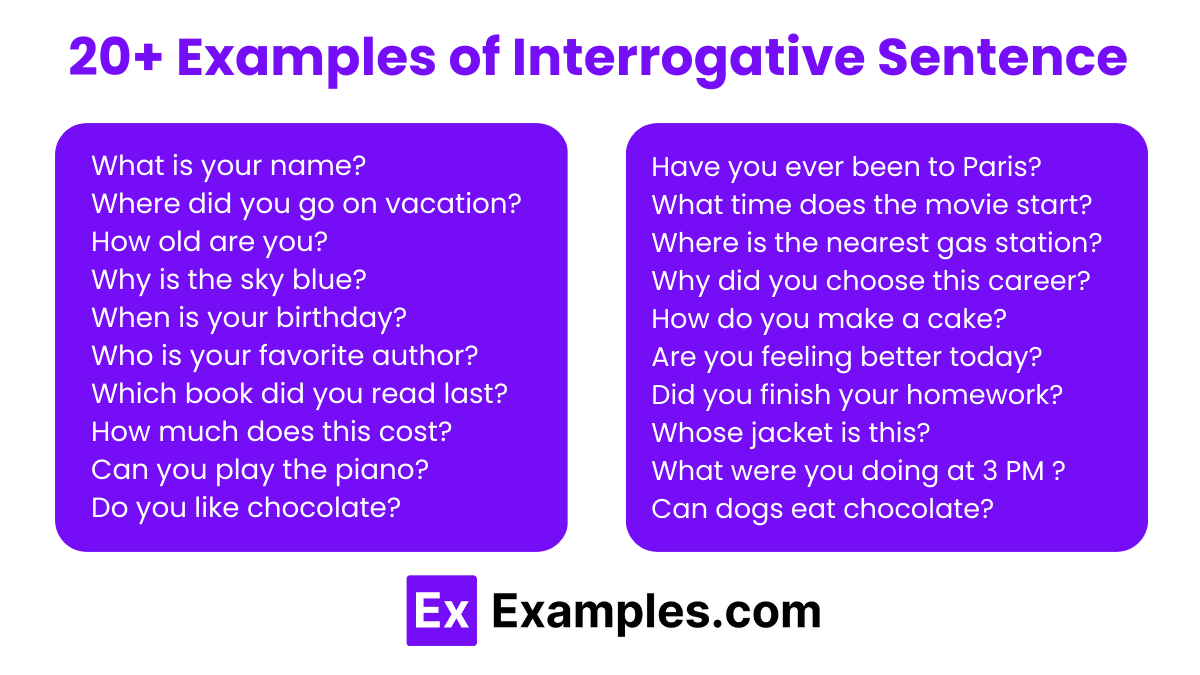20+ Interrogative Sentence Examples
Interrogative sentences are fundamental to language, designed to elicit information from the listener or reader. They are easily recognized by their ending punctuation mark, the question mark (?), and often start with “wh-” question words like “what,” “where,” “when,” “who,” “why,” and “how,” or auxiliary verbs such as “do,” “does,” “did,” “is,” “are,” “can,” and “will.” These sentences are key in facilitating communication, enabling curiosity, and promoting understanding through inquiries.
What is an Interrogative Sentence?
An interrogative sentence is a type of sentence that asks a question and is characterized by its inquisitive nature. It typically requires or invites a response from the listener or reader. Interrogative sentences often begin with a question word such as who, what, where, when, why, or how, and they always end with a question mark (?). These sentences are fundamental in acquiring information, clarifying doubts, and engaging in conversations that seek answers or further explanation.
Interrogative sentences can be categorized into several types, each serving a specific purpose in communication:
- Yes/No Questions: These questions can be answered with a simple “yes” or “no.” They often start with a verb or an auxiliary verb. Example: “Are you coming to the party?”
- Wh-Questions: These questions begin with “wh” words like who, what, where, when, why, and how. They seek specific information. Example: “Where did you buy that book?”
- Choice Questions: These questions provide alternatives for the respondent to choose from. Example: “Would you prefer coffee or tea?”
- Tag Questions: A statement turned into a question by adding a short question tag at the end. They are used to confirm information. Example: “You’re coming to the party, aren’t you?”
- Rhetorical Questions: Questions asked for effect or to make a point rather than to get an answer. Example: “Why me?”
- Leading Questions: Designed to guide the respondent towards a particular answer. Example: “You agree that the policy needs changing, right?”
Structure of Interrogative Sentence
The structure of an interrogative sentence typically involves placing the auxiliary verb before the subject, followed by the main verb and the rest of the sentence. This structure is what distinguishes interrogative sentences from declarative sentences. Here are the common structures based on the type of interrogative sentence:
Yes/No Questions
- Structure: Auxiliary Verb + Subject + Main Verb (+ Complement/Modifier)?
- Example: “Is she coming to the meeting?”
Wh-Questions
- Structure for Questions about the Subject: Wh-Word + Main Verb (+ Complement/Modifier)?
- Example: “Who wrote this book?”
- Structure for Questions about the Object or Other Elements: Wh-Word + Auxiliary Verb + Subject + Main Verb (+ Complement/Modifier)?
- Example: “What did she say about the project?”
Choice Questions
- Structure: Subject + Auxiliary Verb + Main Verb + Option 1 + or + Option 2
(+ Complement/Modifier)?- Example: “Do you want tea or coffee?”
Tag Questions
- Structure: Declarative Statement + Comma + Negative or Positive Tag?
- Example: “You’re coming to the party, aren’t you?”
How Questions
- Structure: How + (Adjective/Adverb) + Auxiliary Verb + Subject + Main Verb?
- Example: “How quickly can you finish this task?”
Rules for interrogative sentences, with Examples
Interrogative sentences, which are used to ask questions, follow specific grammatical rules to ensure clarity and correctness. Here are some key rules along with examples:
Invert the Subject and Auxiliary Verb
For most questions, the auxiliary verb comes before the subject. If there’s no auxiliary verb in the statement form, add an auxiliary like do, does, or did.
- Statement: “She can speak French.”
- Question: “Can she speak French?”
Use Question Words for Specific Information
When seeking specific information, start the question with a ‘wh-‘ question word (who, what, where, when, why, how).
- Example: “Where did you buy these shoes?”
For Yes/No Questions, Use an Auxiliary Verb
If the question expects a yes or no answer, start with an auxiliary verb.
- Example: “Do you like chocolate?”
Place the Question Word Before the Auxiliary Verb
In ‘wh-‘ questions that require more than a yes/no answer, the question word comes first, followed by the auxiliary verb (if any), then the subject.
- Example: “Why is she laughing?”
Use ‘Do’ for Present Simple and ‘Did’ for Past Simple Questions
When forming questions in the present simple tense, use “do” or “does.” Use “did” for past simple questions, regardless of the subject.
- Present Simple Example: “Do you want coffee?”
- Past Simple Example: “Did you see the movie?”
For Tag Questions, Repeat the Auxiliary Verb or Use ‘Do’
Tag questions are short questions added to the end of statements. Use the auxiliary verb from the statement in the tag. If there’s no auxiliary, use ‘do,’ ‘does,’ or ‘did.’
- Example: “You’re coming, aren’t you?”
Keep the Same Tense as the Statement
Ensure the question follows the same tense as the information known or implied.
- Example: “She was at the party.” becomes “Was she at the party?”
Direct Questions End with a Question Mark
All direct questions require a question mark (?) at the end.
- Example: “What time is it?”
For Choice Questions, Include Options in the Question
When presenting options within the question, structure the sentence to include these choices.
- Example: “Would you like tea or coffee?”
Rhetorical Questions Do Not Require an Answer
Rhetorical questions are asked for effect or to make a statement rather than to get an answer.
- Example: “Why bother?”
What is the purpose of an interrogative sentence?
The primary purpose of an interrogative sentence is to ask questions in order to obtain information, clarification, confirmation, or to provoke thought. Interrogative sentences are fundamental in facilitating communication by allowing individuals to express curiosity, gather data, make inquiries about someone’s well-being, or understand the world around them more deeply. They enable dialogue, encourage interaction, and foster learning by prompting responses from others.
20+ Examples of Interrogative Sentence
Download This ImageInterrogative Sentence Types with Examples
| Question Type | Interrogative Sentence |
|---|---|
| General Question | What is your name? |
| Location | Where did you go on vacation? |
| Age Inquiry | How old are you? |
| Reason | Why is the sky blue? |
| Time Inquiry | When is your birthday? |
| Preference | Who is your favorite author? |
| Choice | Which book did you read last? |
| Quantity | How much does this cost? |
| Ability | Can you play the piano? |
| Preference | Do you like chocolate? |
Uses of Interrogative Sentences
Interrogative sentences serve various purposes in communication, enriching our conversations and writings by enabling us to:
- Gather Information: They are primarily used to ask for specific information about a subject, object, time, place, reason, or manner.
- Clarify Doubts: Interrogative sentences help in clarifying uncertainties or confusions, ensuring that we fully understand the information being discussed.
- Facilitate Learning: In educational contexts, they stimulate thinking and discussion, encouraging students to explore and articulate their understanding of topics.
- Engage in Conversation: These sentences are essential for initiating and maintaining dialogue, allowing for an exchange of ideas and opinions.
- Express Curiosity: They are a natural way to express curiosity about the world around us, leading to a deeper understanding of various subjects.
- Make Decisions: By asking questions, we can gather the necessary information to make informed decisions in personal and professional contexts.
- Solve Problems: Interrogative sentences allow us to dissect problems by inquiring about different aspects of a situation, leading to effective solutions.
- Conduct Surveys and Research: They form the basis of questionnaires and interviews, essential tools in collecting data and insights for research purposes.
List of Interrogative Words
- Do – Do you hear that creepy sound?
- Does – Does she know I’m visiting you?
- Did – Did you try to unlock the door?
- How – How were you able to get in the house?
- When – When are you going to leave?
- Where – Where will you wait for me?
- What – What were you thinking?
- Which – Which of the three kings brought gold?
- Who – Who are your group mates?
- Why – Why are you causing him pain?
How to Write Interrogative Sentences
The most important thing to keep in mind when writing interrogative sentences is to know what information you would like to obtain. It is by then that you would be able to construct an interrogative sentence.
There are a lot of ways that you can ask and each of it also gives you a different kind of answer that is why it is really important for us to know how to ask questions correctly so we can also get an equally correct answer as well.
Have you ever wondered how curious minds are fed?
Sure, it is the answers, solutions, and discoveries that satisfy such minds, but before answers would roll out of our tongues, before solutions would prompt us to blurt out “Eureka!”, and before discoveries would give power to the light bulbs in our heads, we do the most fundamental thing that is, asking a question.
A curious mind will no longer be void of information or knowledge once it could ask a question that would make comprehensively address its curiosity. But what if we cannot easily comprehend the exact words that could decipher the discord in our heads? How can curious minds get fed?
That is why it is very important that we should know how to construct effective survey questions in a way that it would not anymore constitute follow-up questions.
Learning a new body of knowledge, information, answers, solutions, and discoveries are important. However, asking the right questions with the correct sentence construction is also equally important. If we know how to construct an interrogative sentence and know its different variations, it gives us room to acquire the correct answers that satisfy our curious minds and it gives us the ability to be able to communicate effectively with all the people we interact every day.
How do you make a sentence into an interrogative sentence?
To convert a sentence into an interrogative, rearrange the sentence so that the auxiliary verb comes before the subject. If there’s no auxiliary verb, add “do,” “does,” or “did.” End with a question mark.
Example: Statement: “You understand.”
Interrogative: “Do you understand?”
What are interrogative words in English?
Interrogative words, also known as “wh-words,” include who, what, where, when, why, and how. They are used to ask questions that require more than a yes/no answer, seeking specific information.
What is an example of an interrogative sentence Class 4?
An example suitable for Class 4: “Why do birds fly?” This question encourages curiosity about nature, suitable for the understanding level of 4th-grade students.
What is an example of an interrogative sentence Class 5?
An example for Class 5: “How does the water cycle work?” This question fits the environmental science curriculum often introduced at this grade, sparking interest in natural processes.




